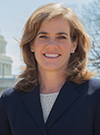By Bob Allen
A Baptist religious-liberty lawyer says recent debate over the definition of marriage reveals a long-overlooked mingling between church and state.
Hollyn Hollman, general counsel of the Baptist Joint Committee for Religious Liberty, noted in a recent article that marriage was around as a religious institution long before civil marriage laws were enacted in the United States.
 Because of the way states have traditionally used religious entities to perform legal marriages, however, that distinction is lost on many Americans, begging the question of why so many ministers strongly committed to keeping church and state separate willingly function as government agents in pronouncing couples legally wed.
Because of the way states have traditionally used religious entities to perform legal marriages, however, that distinction is lost on many Americans, begging the question of why so many ministers strongly committed to keeping church and state separate willingly function as government agents in pronouncing couples legally wed.
Writing in the November/December 2014 issue of Report from the Capitol, Hollman quoted one scholar who observed that Americans have gotten so used to hearing ministers use the phrase “by the power vested in my by the state” that “we don’t even realize how weird that is.”
Hollman said long before current debates about whether same-sex couples are entitled to benefits of marriage and whether gay unions should be recognized by that title, she heard thoughtful Baptist pastors question the role of pastors as agents of the state in marriage ceremonies.
“Many find ways to avoid or minimize that connection as they perform weddings,” Hollman said. “Some routinely explain the different meanings of marriage during ceremonies.”
“Strong advocates for church-state separation who stand against government efforts to usurp religion through government funding or sponsorship of religious exercises are right to be skeptical about letting the state use them,” she said. “Many have admirably educated their congregations about the complex, but importantly distinct, roles of the church and the government.”
Varied motives
Hollman noted that in recent years some pastors who support civil recognition for same-sex couples have refused to sign marriage certificates to protest laws banning gay marriage. More recently, conservative pastors are refusing to sign marriage certificates to protest changes in the law granting marriage equality to gays.
Such choices, she said, affect not only the couple but also the church’s witness to those in attendance and to the wider community.
Hollman said despite the complexity of the relationship between religious and civil marriages, the BJC — an education and advocacy organization representing 15 national, state and regional Baptist bodies in the United States — welcomes the discussion.
“The good news for religious liberty is that churches remain free to make the autonomous decision about whom to marry — without state interference,” she said. “Likewise, there are always options for civil marriage that do not include a minister’s signature or religious ceremony. The separation is up to us.”
Hollman said it is likely that eventually the Supreme Court will step in to resolve the legal question of whether there is a constitutional right to marry. In the meantime, she said, “churches should decide and make clear whether they are performing marriages by the authority of the state or a greater power.”
